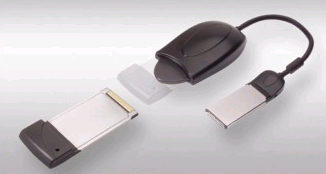With latest OS X drivers, Duel's PCMCIA to ExpressCard adapter impresses us (so far)


In Panasonic's AG-HVX200 video camera, we felt (and still feel) that we had found the perfect video camera given our need for speed when it comes to producing video. It can record video (even HD video, although we don't use that feature) to tape just like many other digital video cameras. But what makes the AG-HVX200 special is its ability to record to Panasonic's P2 cards which are based on the PCCard (PCMCIA) form factor. What's so great about this?
Well, whereas getting video into a computer for post-production (editing) usually requires playing the video back while the video camera is attached to a PC via a FireWire cable, with the AG-HVX200, you just pop the P2 card out of the camera and into the PC Card slot on your notebook computer. Not only does the P2 card store each clip as a completely independent file (super useful for non-linear editing when compared to tape), eliminating the FireWire process means that the camera can spend most of its time doing what it does best: gathering video (instead of being stuck next to a computer uploading its video over a FireWire at the tape engine's native speed).
So far so good, right? Well, sort of. We use Apple's Final Cut Pro to edit almost all of our video at CNET and ZDNet. One thing we discovered early on (when we were refining our business process) is that the PowerBook G4's (even the fastest ones) are woefully inadequate for heavy duty post production. Editing was slow. Encoding was slow. Everything was slow. And in this day and new age of media and publishing companies, there's no room for slow. So we needed something faster like one of the new MacBook Pros (we have to have a notebook for doing video while traveling).
But there was one problem. All the new MacBooks have ExpressCard/34 slots instead of the PCCard slots that the PowerBooks had. "Surely," we thought, "Apple must have thought of this" and come out with an adapter. But, as I reported earlier, it didn't. But a small company known as Duel Systems did. It has been almost three months since I first reported that the company was going to release such an adapter (pictured above left) and during that time, we received a demo unit that supported OS X, but not the latest version that we had on our MacBook Pro (10.4.9). It came with an older OS X driver that badly crashed our system. As a result, we had to insert an unwanted step in our business process.
We had to plug the card into the old PowerBook, copy the video to a FireWire-based external hard drive, and then connect that hard drive to the MacBook Pro. What we really needed to do though was eliminate the PowerBook from the process altogether. Yesterday, the company released a beta driver for OS X 10.4.9 and this morning, we gave it a go and we're happy to report that OS X 10.4.9, Panasonic's P2 Card drivers, and Duel Systems' PCCard/ExpressCard drivers are happily co-existing in a way that OS X isn't crashing and Final Cut Pro is able to import the video directly off the P2 Cards. Only time will tell if these drivers can be relied on for the long haul. But for now, it appears as though this $119 adapter will be well worth its price (or its weight in gold, and then some).